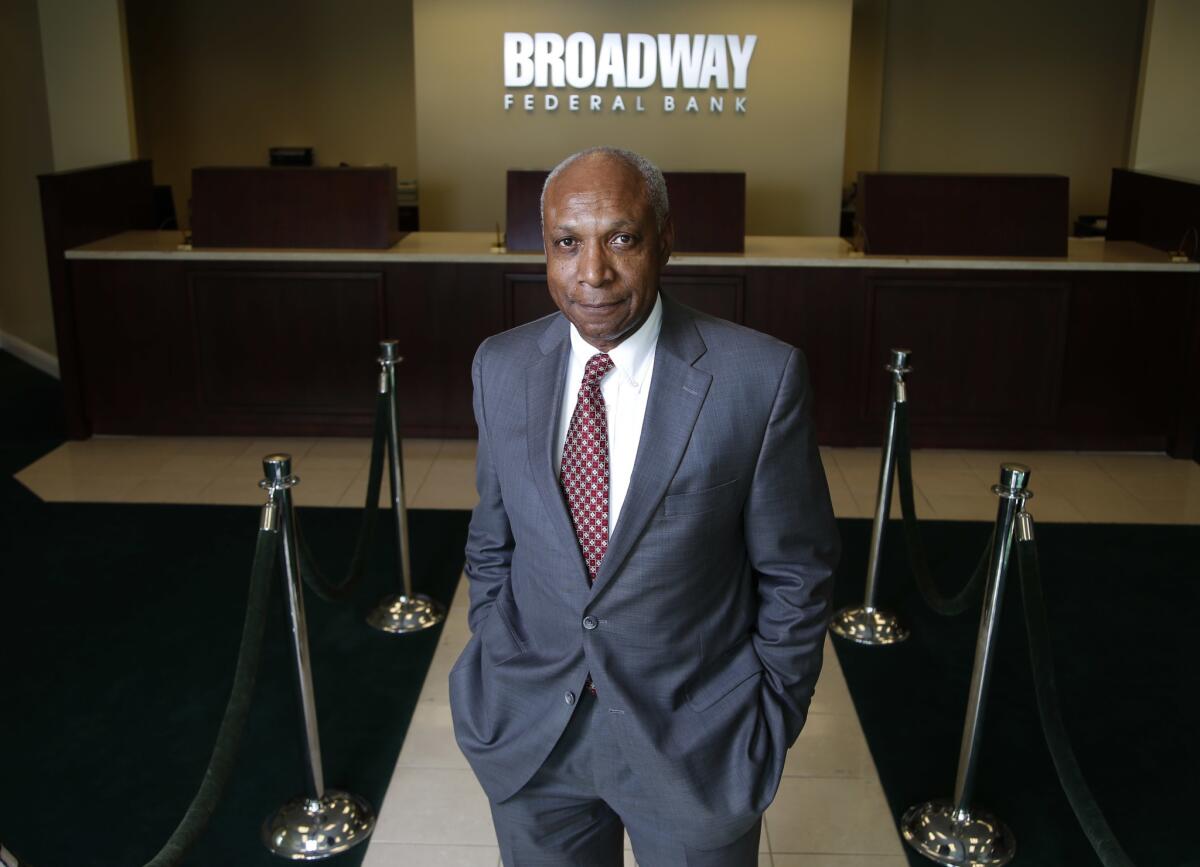Insider is sentenced to prison in scam that nearly took down L.A.’s last black bank

A loan officer who peddled bad loans to churches across the country — a scam that nearly took down L.A.’s last black-owned bank — was sentenced this week to federal prison, ending a lengthy saga for Broadway Federal Bank.
Paul Ryan, 49, of Torrance pleaded guilty two years ago to running a scheme in which he approved loans to churches that were on shaky financial footing in exchange for bribes of $354,000. As part of his 18-month sentence handed down Monday, Ryan will have to pay that same amount in restitution to Broadway Federal.
Ryan worked for the bank from 2007 through 2010, years during which Broadway dramatically expanded its portfolio of loans to churches. That expansion nearly bankrupted the lender once those loans started to sour.
The bank, founded in 1946 by black entrepreneurs including architect Paul R. Williams, had long provided loans to local houses of worship, but in 2007, with Ryan’s help, it started lending to churches across the country.
In 2006, the year before Ryan started at Broadway, the bank’s church loan portfolio amounted to $17.7 million, or about 7% of all loans. By the end of 2009, that number had jumped to $101 million, representing 22% of all loans.
But many of those loans soon went bust. At the end of 2011, more than half of the bank’s bad loans were church loans.
At the time, the bank blamed the poor performance on the recession and a decline in church offerings. That was probably a contributing factor, but perhaps not the leading cause of the bank’s problems.
As it turns out, Ryan was working with loan brokers to provide loans to churches that should not have qualified in the first place. In his guilty plea, Ryan admitted to accepting kickbacks from loan brokers and approving loans using doctored financial information that made churches appear more creditworthy than they were.
Federal prosecutors said loans approved by Ryan resulted in losses of more than $5 million to Broadway, but Wayne-Kent Bradshaw, the bank’s chief executive, said the figure is probably much higher.
He estimated that Ryan originated about $90 million in loans, many of which were made with doctored financial information, resulting in losses of as much as $30 million.
“It was by far the major basis for problems at the institution. It was a big and bad operation,” said Bradshaw, who joined the bank in 2009 and became chief executive in 2012. “Broadway had a large church portfolio, and it fell apart. We found out it was the making of a rogue lender.”
Federal regulators and investigators, not Broadway, uncovered the scheme, Bradshaw said.
The investigation into Ryan and another participant in the scam, loan broker Chester Peggese, was handled by the FBI, IRS, Federal Deposit Insurance Corp. and Office of the Special Inspector General for the Troubled Asset Relief Program, or TARP.
Peggese pleaded guilty to bank fraud last year and in February was ordered to pay $4.2 million in restitution and serve a year and a day in federal prison.
Broadway received a $15-million loan from TARP to shore up its balance sheet after incurring big losses — driven mostly by church loans — in 2009.
The bank was never able to repay that loan. The U.S. Treasury in 2013 agreed to swap its debt for Broadway stock and remains the largest shareholder in the bank, which is partly owned by Koreatown’s Bank of Hope but is still considered a black-owned institution by regulators.
Broadway stopped making church loans in 2010 after federal regulators ordered it to cease the practice. Though that order was lifted last year, Bradshaw said he has no plans to get back into that business.
The bank still has $43 million in church loans on its books. Bradshaw said that’s more than enough for Broadway, which has total assets of $408 million.
“A church loan can be a good loan,” he said. “If someone wants to make that decision, that’s fine. It’s not one that I want to make.”
The bank, which is headquartered in Mid-Wilshire and has branches near USC and in Inglewood, now focuses on making loans for apartment-building acquisitions by small investors.
Follow me: @jrkoren
More to Read
Inside the business of entertainment
The Wide Shot brings you news, analysis and insights on everything from streaming wars to production — and what it all means for the future.
You may occasionally receive promotional content from the Los Angeles Times.











